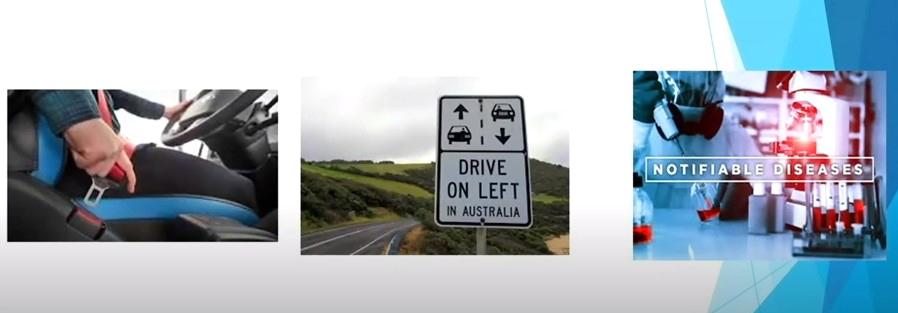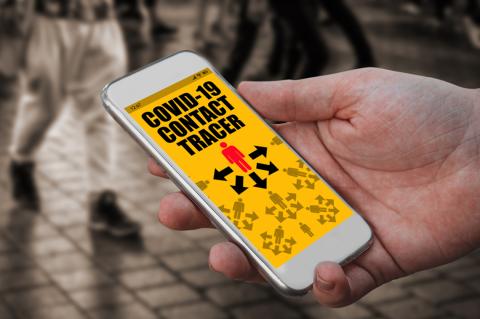Privacy in a Pandemic?
Oxford Professor Explores Ethics of Contact Tracing

New technology forms the backbone of several leading Covid-19 vaccines, enabling their development at unprecedented speed. Enhanced technology also has accelerated another important Covid-fighting tool, contact tracing, which notifies people of potential infectious exposure so they can take necessary precautions—self-isolating and testing—to slow disease spread. Digital contact tracing can warn people fast. Using it, though, comes with a personal tradeoff—the risk to privacy.
Speaking from his home in England on the day the Pfizer-BioNtech vaccine was approved in his country, Dr. Michael Parker discussed the ethical merits and drawbacks of digital contact tracing during a pandemic. A bioethics professor and director of the Ethox Centre and the Wellcome Centre for Ethics and Humanities at the University of Oxford, he argued that, during a global health emergency, everyone with a cell phone has a moral obligation to participate in digital contact tracing.
Dr. David Wendler, who heads the Clinical Center department of bioethics’ research ethics section and introduced Parker’s CC Grand Rounds talk, said, “Contact tracing is one of the most important public health measures for addressing infectious disease outbreaks and epidemics.”
Tracing technology, however, hasn’t completely replaced human effort. One method still widely used today is manual contact tracing, in which someone calls the infected person to identify possible exposures; health officials then follow up to warn those contacts. But this method can be slow and unreliable.
Manual tracing “relies on the cooperation and also the recall of the people who are infected,” said Wendler. There’s also a significant delay, since contacts aren’t collected until after the infected person tests positive.

With digital tracing, information is collected in real time using Bluetooth technology on the user’s phone, “so we’re not waiting until [someone] gets symptomatic,” Wendler said. “That information is being collected just as I go about my daily life.”
Both manual and digital contact tracing involve personal data collection that would be inappropriate outside of a public health emergency, said Parker. Most people accept this intrusion during a pandemic, but others refuse to cooperate or evade the system because it infringes on their privacy.
“Anyone demanding absolute privacy in the context of a public health emergency is unethical,” asserted Parker.

In normal times, patient choice and personal autonomy often reign supreme. But during a pandemic, said Parker, clinical bioethics get replaced by public health rules.
“The aim is targeting the benefit of populations as a whole,” he said, “and often those kinds of interventions, for example mandatory vaccination, involve a trade-off between individual freedoms and overall population health benefits.”
One public health intervention used globally during Covid-19 has been the lockdown. At one point in April 2020, nearly 4 billion people worldwide were ordered to stay home. Lockdowns do slow disease spread, but they come at enormous financial, social and personal cost.
“These [sacrifices] seem justified when there are no other tools available,” said Parker. “But those justifications seem much weaker in situations when there might be other ways of managing physical distancing in a way that’s more evidence-based, more targeted and more risk-adjusted.”
Tools such as contact tracing and mass testing, he said, “inform self-isolation and the identification of clusters for targeted public health measures rather than general measures, which affect everyone and cause great harm.”

Photo: Bill Oxford/iStock/Getty Images Plus
There are two basic models of digital contact tracing. With the individual patient model, cell phones record proximity and, if someone tests positive for Covid-19, his or her cell phone anonymously pings contacts to alert them of potential exposure.
The other, the public health model, is more centralized. If someone tests positive, the contacts recently in that person’s radius get uploaded to a public health system, which alerts them. The more extreme version of this model would be compulsory and centrally organized. A weaker version links to a centralized public health system, but users voluntarily participate.
“A weakly centralized approach—a weak version of the public health model—is one that is ethical and, more than that,” said Parker, “I want to argue that we have an obligation to have such a system and participate in it.”
The individual patient model has minimal privacy risks, since all data remains on the user’s phone, and that may motivate more people to download the app and use it. On the other hand, while the public health model poses a privacy risk, it can have a faster, wider impact on disease spread. Involving the public health system also allows officials to analyze data, identify clusters and better target public health responses locally.
“If there are protections in place, there’s a very strong obligation to download and use a contact tracing app that’s a public health system-based approach,” said Parker.
Those protections, he added, should include independent oversight and transparency of how data will be used and when data collection would stop. Parker also urged a commitment to inclusion, equity and social justice, namely social protections for those disproportionately affected by the pandemic.
“There’s a strong disincentive for some people to self-isolate,” he said during Q&A. Low-income, frontline workers, for example, need compensation if forced to spend weeks quarantining without income.
Parker emphasized that downloading the app should be voluntary. “I think the broader success of our fight against Covid depends on well-established and justified public trust and confidence,” he said, which could be undermined if participation were compulsory. He does, however, argue that as people in a community with others, we have a moral obligation to download an effective app, given appropriate safeguards.
Digital contract tracing can provide fast, reliable, life-saving data during a pandemic. Technologic advances—from digital contact tracing, to new vaccine platforms, to rapid testing—have the potential to move us beyond Covid-19 and guide us through future pandemics.
